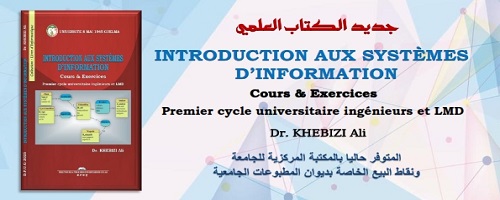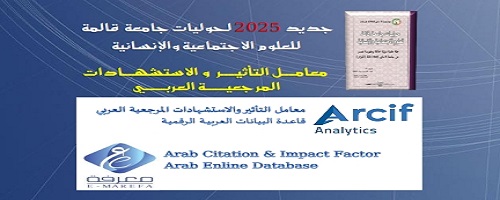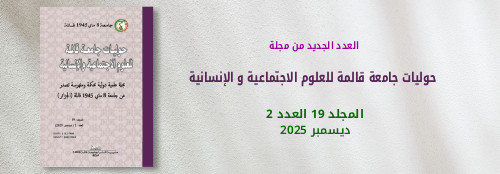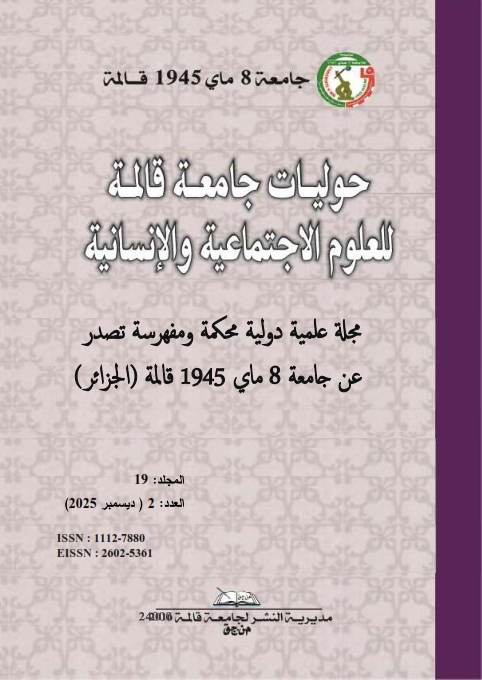واقع التزام الشركات النفطية في الجزائر بمبادىء وأبعاد المسؤولية الاجتماعية بالإشارة لحالة شركة سوناطراك –فرع المؤسسة الوطنية لأشغال الآبارENTP--
المجلد 13-العدد 2- ديسمبر 2019
عبد المالك مهري (1)
نوفل سمايلي(2)
جامعة العربي التبسي-تبسة
المؤلف المراسل:
تعتبر المسؤولية الاجتماعية للشركات الآن الاتجاه السائد، بعد أن كانت استعراضا لفعل الخير في السابق. إلا أن عددا قليلا من الشركات يمارسها بصورة جيدة، ففي عصرنا هذا عصر العولمة والاندماجات الضخمة تفاقمت المشكلات الاجتماعية وطفت إلى السطح تناقضات وأزمات كانت مجهولة أو كانت الأدوية المسكنة تفلح في إخفائها.
من هنا جاءت هذه الدراسة باحثة في مدى إمكانية التزام المؤسسات البترولية في الجزائر بالمسؤولية الاجتماعية، حيث تم تقسيمه الى قسمين رئيسين: القسم النظري وفيه تم التعرض الى كل من المسؤولية الاجتماعية للشركات البترولية، بالإضافة الى مختلف الدراسات السابقة التي تناولت هذا الموضوع، في حين خصص القسم الثاني للدراسة الميدانية من خلال تبيين طريقة وأدوات الدراسة بالإضافة الى النتائج والمناقشات. حيث تم إختيار شركة سوناطراك وبالتحديد فرع مؤسسة أشغال الآبار كعينة لتطبيق هذه الدراسة، حيث تم توزيع إستمارة إستبيان على جميع الطاقم العمالي للمؤسسة.
ولاختبار فرضيات الدراسة تم استعمال مجموعة من الأساليب الإحصائية، كالمتوسط الحسابي المرجح والإنحراف المعياري للوصول إلى نتائج تساعدنا في الحكم على المؤسسة، وأهم النتائج التي توصلت لها الدراسة نذكر:
- رغم تنوع وتعدد الأراء حول مفهوم المسؤولية الإجتماعية من تصنيفها بأنها إلتزام على عاتق الشركات إلى تصنيفها كذلك بأنها إستجابة طوعية، إلا أنها لا تخرج على كونها أعمال خيرية هادفة سواء للعمال أو للمجتمع.
- أن التقيد والإهتمام بمبادئ وأبعاد المسؤولية الإجتماعية لا يتنافى مع أهداف وآفاق الشركات البترولية.
- أن المؤسسة محل الدراسة (المؤسسة الوطنية لأشغال الآبار) لاتطبق أبعاد المسؤولية الإجتماعية.
الكلمات المفاتيح: العولمة، المسؤولية الإجتماعية، المؤسسات البترولية، سوناطراك، الجزائر.
La responsabilité sociale des entreprises est désormais la norme, après avoir été une démonstration de bonnes actions dans le passé. Toutefois, peu d'entreprises y parviennent bien: à l'ère de la mondialisation et des fusions, les problèmes sociaux ont été exacerbés et les contradictions et crises inconnues ou soulagées par des analgésiques ont été dissimulées.
Par conséquent, cette étude examine la possibilité que les institutions pétrolières algériennes s’engagent en faveur de la responsabilité sociale, où elle était divisée en deux parties principales: la partie théorique dans laquelle est exposée à la fois la responsabilité sociale des sociétés pétrolières, ainsi que diverses études antérieures traitant de ce sujet, La deuxième partie de l’étude de terrain montre la méthode et les outils de l’étude, ainsi que les résultats et les discussions. La Sonatrach, en particulier la branche puits, a été choisie comme échantillon pour l’application de cette étude et un questionnaire a été distribué à tous les employés de la Fondation.
Pour tester les hypothèses de l’étude, un ensemble de méthodes statistiques, telles que la moyenne pondérée et l’écart-type permettant d’atteindre les résultats, nous aide à juger l’institution, les résultats les plus importants de l’étude mentionnés:
Malgré la diversité des opinions sur le concept de responsabilité sociale issu de sa classification en tant qu'obligation incombant aux entreprises de le classer comme une réponse volontaire, il ne s'agit toutefois pas d'une œuvre de bienfaisance tant pour les travailleurs que pour la société.
Le respect des principes et des dimensions de la responsabilité sociétale n'est pas incompatible avec les objectifs et les perspectives des sociétés pétrolières.L'institution étudiée (National Well Works Foundation) n'applique pas les dimensions de la responsabilité sociétale.
Mots-Clés : Mondialisation, responsabilité sociale, institutions pétrolières, Sonatrach, Algérie
CSR is now the mainstream, having been a review of good deeds in the past. But a few companies are doing well. In our age of globalization and massive mergers, social problems have been exacerbated and contradictions and crises have been unknown or the sedatives have been able to conceal them.
This study is a study of the extent of the commitment of the petroleum institutions in Algeria to social responsibility. It was divided into two main sections: the theoretical section, which dealt with both the social responsibility of petroleum companies, in addition to the various previous studies that dealt with this subject, The second section of the field study, through the definition of the method and tools of the study in addition to the results and discussions. Sonatrach was selected as a sample for the implementation of this study. A questionnaire form was distributed to all the employees of the Foundation.
In order to test the hypotheses of the study, a number of statistical methods were used, such as weighted mean and standard deviation, to reach results that help us to judge the institution. The most important findings of the study are:
Despite the diversity and diversity of views on the concept of social responsibility as a corporate obligation to classify it as a voluntary response, it does not come out as charitable acts intended for workers or the community.Adherence to and attention to the principles and dimensions of social responsibility is not incompatible with the objectives and prospects of oil companies.The institution under study (National Well Works Institution) does not apply the dimensions of social responsibility.
Key words: Globalization, Social Responsibility, Petroleum Institutions, Sonatrach, Algeria.




